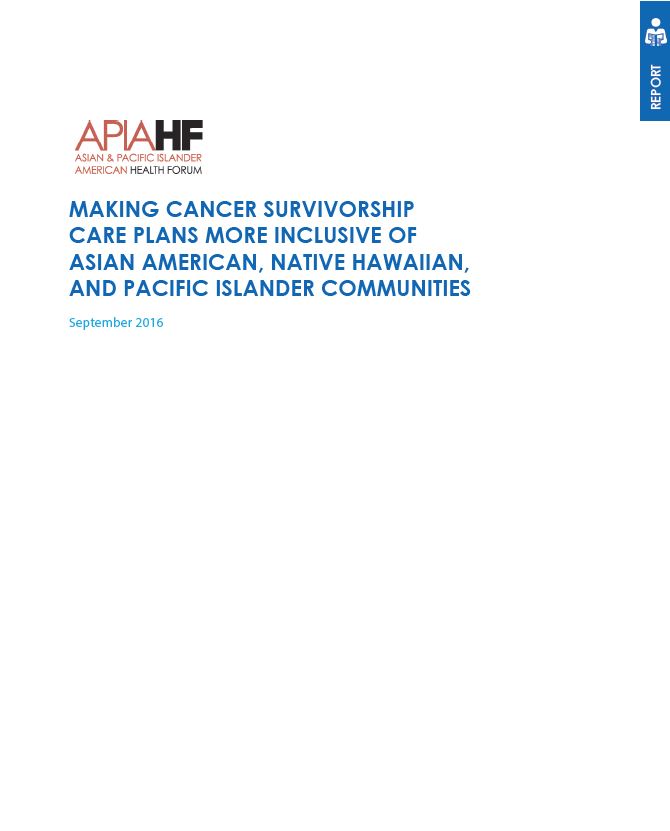Cancer is the leading cause of death for Asian Americans, Native Hawaiians, and Pacific Islanders (AAs and NHPIs). AAs and NHPIs experience higher rates of cancer than other racial groups. In addition, they continue to experience the lowest screening rates and are less likely to be diagnosed with cancer at a localized stage. Some of the reasons that explain this include the lack of health insurance and access, financial concerns, lack of linguistically and culturally competent health care, and distrust or fear of the health care system due to certain cultural norms or beliefs. “More than 15.5 million children and adults with a history of cancer were alive on January 1, 2016, in the United States.”i Due to advances in early detection and treatment, more people are surviving from cancer than ever before. By 2026, the population of cancer survivors in the U.S. will increase to nearly 20 million.
Cancer care does not end with the completion of treatment. There is a high risk of cancer recurrence involved, as well as the potential development of a new or different type of cancer. “Patients are not receiving care that prepares them for—or supports them after—the end of cancer treatment. Few health care providers are familiar with the short-and-long-term consequences of a cancer diagnosis and treatment, and there is a lack of clear evidence about what constitutes best practices in caring for patients with a history of cancer. This is especially true in underserved populations.”ii AA and NHPI cancer patients are among the many that get lost in the health care system after treatment. Too many cancer survivors get lost in the transition from cancer patient to cancer survivor. Post treatment care often consists of inconsistent communication and coordination among the survivor and their health care team, fragmented and/or duplicated services, and insufficient attention to the side effects and after effects of the treatment received.
The 2005 Institute of Medicine (IOM) report, From Cancer Patient to Cancer Survivor: Lost in Transition, recommended that all patients completing primary cancer treatment receive a comprehensive treatment summary and a survivorship care plan (SCP) during end-of-treatment consultations by 2015. “Such plans would summarize information critical to the individual’s long-term care, such as the cancer diagnosis, treatment, and potential consequences; the timing and content of follow-up visits; tips on maintaining a healthy lifestyle and preventing recurrent or new cancers; legal rights affecting employment and insurance; and the availability of psychological and support services.”
In 2012, the Commission on Cancer (CoC), a program of the American College of Surgeons (ACoS) released a new standard focused on the delivery of survivorship care plans in Cancer Program Standards 2012: Ensuring Patient-Centered Care.”iv Disseminating survivorship care plans to Stage I, II, and III cancer patients that completed therapy became a factor in facilities obtaining CoC accreditation. The CoC mandated that the new standard (standard 3.3) was to be implemented by 2015, but a survey that was disseminated to CoC’s accredited programs in early 2014 found that “only 37% of responding cancer programs felt “completely confident” that their program would be able to implement the standard and only 21% indicated that a survivorship care plan had been developed. In response, the CoC updated the scope and timing of its standard. By January 1, 2015: implement a pilot survivorship care plan process involving 10% of eligible patients; by the end of 2016: provide survivorship care plans to 25% of eligible patients; by the end of 2017: provide survivorship care plans to 50% of eligible patients; by the end of 2018 and beyond: provide survivorship care plans to 75% of eligible patients; and by January 1, 2019: provide survivorship care plans to 100% of eligible patients.”
There are many other problems associated with SCPs including the lack of research to show the impact on cancer survivorship outcomes, not addressing unique cultural needs and not being provided in-language. Not addressing cultural needs and not being provided in-language are specific ways that survivorship care plans are not culturally and linguistically competent or inclusive of AA and NHPI communities. These factors will be addressed later in the findings section of this report.

